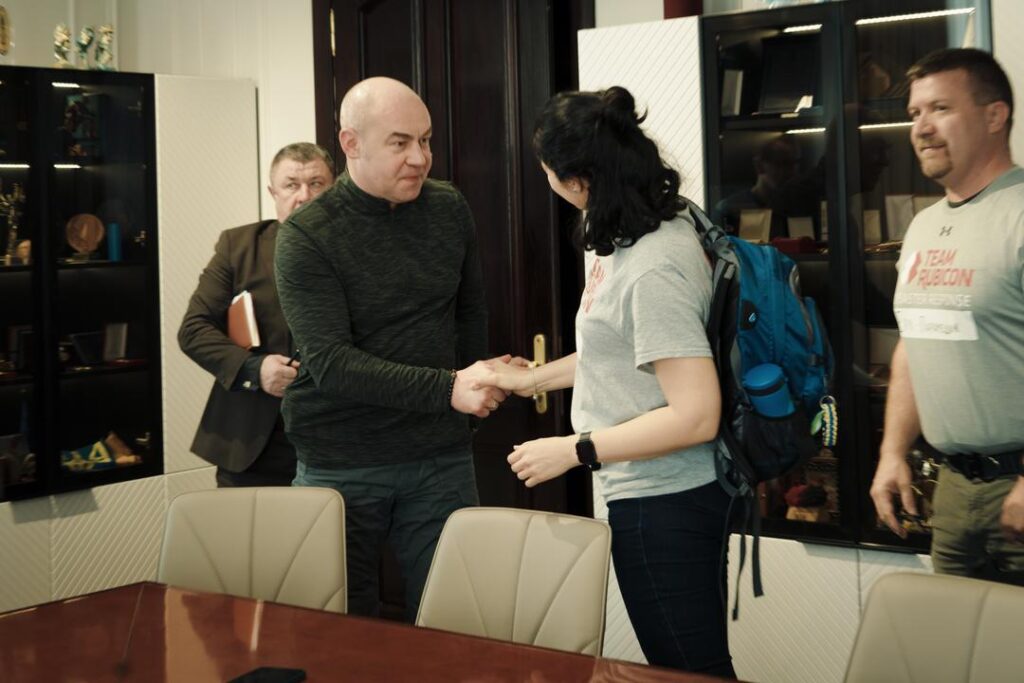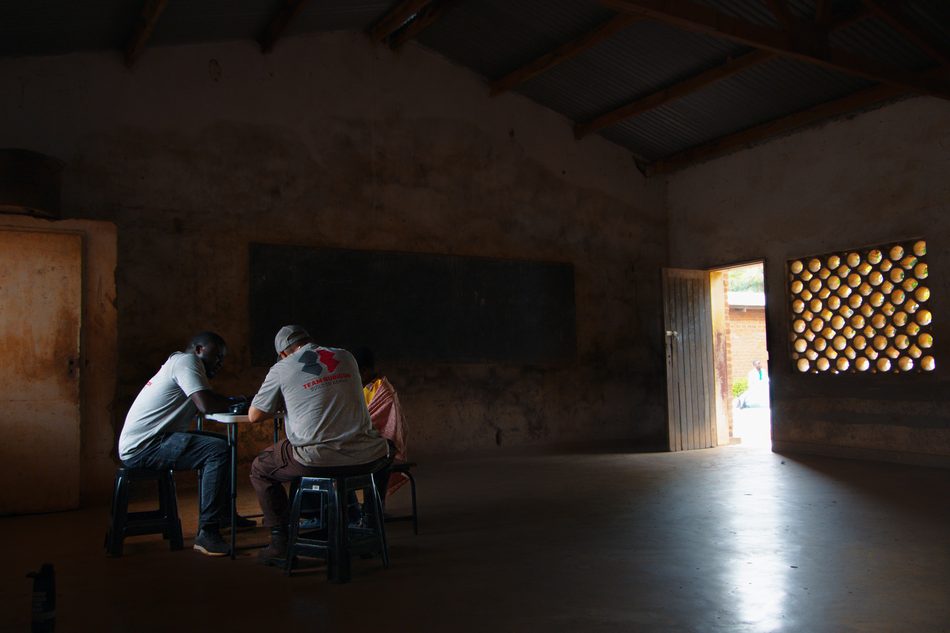Military veterans are increasingly demonstrating themselves as valuable assets in global humanitarian aid. That is what the scholarship of Dr. Stanislava Mladenova, Global Fellow at Brown University’s Center for Human Rights and Humanitarian Studies and a Fellow at the Irregular Warfare Initiative at West Point, is pointing to. A practitioner and scholar specializing in the relationship between military and civilian organizations in low-intensity conflict zones and within fragile states, Mladenova is the author of the forthcoming book “When Rambo Meets the Red Cross” from Rowman & Littlefield. Her practitioner experiences is shaped by a two-year deployment to Afghanistan as a Political Advisor to the NATO Senior Civilian Representative focused on issues like corruption, disaster management, humanitarian assistance, and the recruitment of child soldiers as well as assignments in Africa, Central and South Asia, South America, Western Europe, and the Balkans.
Dr. Mladenova is also a Team Rubicon volunteer—or Greyshirt—and, in June, brought her professional learnings and insights to about 50 of her fellow Greyshirts as part of the organization’s monthly humanitarian professional development series. During the seminar, Mladenova talked about the increasing value of veterans in humanitarian work, outlining her thesis: that humanitarian environments are getting riskier, more individuals and organizations are emerging into the space, and the veteran’s distinctive ability to navigate conflict spaces is invaluable to humanitarian work. That includes in fragile spaces—those places where there isn’t huge, high-intensity conflict active but where there’s not a complete peace, either. “It’s neither war nor peace, but something in between,” she explained, a “vicious cycle of security and security that is constantly reinforcing one another.”

Today, explained Mladenova, there’s an increased presence of both humanitarian and development NGOs in such fragile states—critical, given that, according to predictions from the Organization for Economic Cooperation and Development, one in four people around the world will be living in fragile spaces by the end of the decade.
“Development money used to be reserved for peaceful places,” Mladenova said, “where security is established already.” The idea was that without peace, development was unlikely to succeed, so NGOs would only enter a region after security had been determined; after conflict ended. “But now we know that security and development and humanitarian assistance are happening at the same time.”
One way NGOs are reacting to the proliferation of fragile states is by using the skills of those who possess military experience within their humanitarian ranks. “Several NGOs are directly recruiting veterans and making it part of their branding and business model. We deeply need the skills they have—people able to navigate security and drastic changes of conditions, and who are able to mobilize quickly and with little information. It’s kind of a no-brainer that veterans with these skills are involved in and attracted by this kind of work,” said Mladenova.
“First, their leadership and technical qualities are very attractive. Second, they know the terrain, they know the arena, they know these kinds of places and how to operate in them,” said Mladenova. “The research shows that either veterans are hired as direct implementers due to their knowledge, experience, and leadership skills in these spaces, or they start their own NGOs to do the work in these spaces.”
But the value of veterans in humanitarian work extends beyond their leadership training, technical skills, and experience in security matters, according to Mladenova. They also come with soft skills that make them incredible assets. “Many veterans exhibit very strong cultural and language skills, by function of their military training. Those skills are similar to what NGOs have, especially those with a long-term presence in the field.”
Mladenova says that some NGOs, and especially those working on development programming, have typically recruited talented young staff, “but these young people may be less able to navigate insecure settings when left to their own devices than veterans would be able to,” she said. “You’re asking tactical people to think strategically,” clarified Mladenova, “much like asking a headquarters person to think like a field person, and vice versa.” Veterans, meanwhile, come into these spaces with tested skills, “knowing full well how things can literally change from one minute to the next.”

It’s a concept that hearkens back to one many veterans will find familiar: the strategic corporal. Corporals, the lowest-ranking non-commissioned officer in the U.S. Marine Corps, typically lead small teams and, in dangerous situations or combat zones, may have to make quick decisions that can impact strategy at a high level. Those decisions, made by a low-ranking officer in the field, can end up dictating the decisions of high-ranking generals and policymakers in Washington, D.C. Mistakes made in the field by humanitarian aid workers can affect the ability of an NGO to continue serving in a particular country or region and limit the choices of their executive leadership.
Rapidly escalating tensions in a fragile state is another reason veterans are of such utility as NGO staff: they are disproportionately experienced in such situations. “The thing to remember,” Mladenova said, “is that military members have as much training in how to deal with civilians as NGO members do to deal with the military. As NGOs continue to operate in these complex and fragile spaces, veterans will continue to be attractive candidates. This can be a good organizational decision in addition to a good staffing decision.”
The research shows that retired veterans “gone NGO” can help facilitate a better relationship between the NGOs and security entities. As a result, the veterans’ presence in the fragile states where NGOs typically work, states Mladenova, has another unique angle. “In the most remote settings, hundreds of miles from an embassy and the big city where most internationals spend their time, ordinary villagers may never see a diplomat, minister, or ambassador, but they will probably see a soldier and an NGO worker,” she said. “So that street-level interaction between the military and NGOs is even more important. Clearly, NGOs and the military will always remain different organizations with different objectives. There will always be a divide between them, and even retired veterans-gone-NGOs cannot avoid seeing things primarily through a security lens. But because they face some of the same field challenges, they have an opportunity to have a mutual understanding as tacticians, not as civilians or military.”
In this context, veterans are uniquely placed to be strategic facilitators, especially when they can capitalize on those soft skills and navigate those fragile spaces prudently, with restraint and good judgment.
In the end, argued Mladenova, fragile states and the dynamics within aren’t going away anytime soon, and NGOs must be best prepared to respond within them. “According to OECD, within this decade, 1 in 4 people will be living in fragile states, and these places will be written by insecurities,” said Mladenova. “Or, climate change due to resource dependence, natural disasters, and more will further exacerbate a vicious cycle of poverty and security and fragility, and wars will continue to scale up.”
Rather than deploy hard power actors—active military—to a space that doesn’t necessitate it, but where humanitarian aid is desperately needed, well-equipped NGOs should be stepping in. Military should be for warfighting, not soft power activities. Rather, it’s NGOs whose ranks are filled with people who have the skills, knowledge, and expertise that comes from past military service who can have the greatest success in fragile states.
The Importance of Ongoing Humanitarian Professional Development
Stanislava Mladenova’s seminar “When Rambo Meets the Red Cross” is the fifth installment in Team Rubicon’s International Learning Series, which is designed to help ensure those who deploy internationally as volunteers are as up-to-date on emerging issues in humanitarian aid as NGO staff elsewhere would be.
“The global humanitarian space changes rapidly and we must keep our Greyshirts informed to allow them to adapt on the ground,” said John Nonnemaker, Team Rubicon’s Deputy Director of Field Leadership and Training and the organizer of the monthly seminars. “This development series helps our team grow professionally and makes overall better responders.”
Ensuring Humanitarian Volunteer Competency
Knowing that humanitarian workers on the ground can inadvertently affect the short-term goals as well as the long-term strategies of an organization, and to ensure that every Greyshirt who deploys internationally has the right mix of hard and soft skills, Team Rubicon launched its International Training and Selection Course (ITSC) in 2022. The intense, in-person, week-long course is held in remote areas and designed to ensure that only people possessing multicultural competency, an understanding of and dedication to humanitarian principles, and the ability to rapidly adapt to tense situations can serve with Team Rubicon abroad. So rigorous is ITSC that not all who participate pass: to date, just 72% of candidates who attended have passed and been vetted for international humanitarian volunteer work with Team Rubicon.



